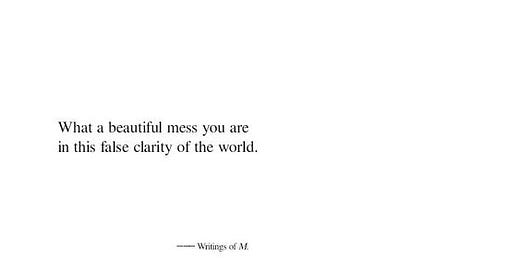The Seductions of Clarity
Man has fallen victim to seduction since times immemorial but not many would think one cause could also be noble search of clarity
In pursuit of intellectual adventure I tend to read at least one research paper from random domain every week. Recently read through a paper “The Seductions of Clarity” by C. Thi Nguyen. Here are some thoughts triggered post reading it.
The pursuit of clarity, while seemingly an earnest endeavour, can unfurl a tapestry of cognitive distortions and unveil a realm where understanding becomes a treacherous seductress. The allure of clarity is intrinsically linked to our understanding of the world around us, serving as a beacon signalling the culmination of our inquiries and reflections. The presence of this sense of clarity acts as “a thought-terminating heuristic”, guiding our cognitive processes and shaping our perceptions of understanding.
This reliance on clarity, however, opens the floodgates to significant cognitive vulnerabilities, paving the way for external forces to exploit and manipulate our sense of understanding. The perpetrators of epistemic manipulation can, by imbuing a belief system with an exaggerated sense of clarity, compel us to truncate our inquiries prematurely, leaving the inconsistencies and flaws within the system unexamined and unquestioned.
To dissect this notion further, one must delve into the realm of genuine understanding. True understanding bestows upon us cognitive facility— the ability to categorize, correlate, elucidate, and communicate with an ease that transcends superficial comprehension. It is this authentic understanding that epistemic manipulators attempt to mimic, endeavouring to endow a system of thought with an exaggerated sensation of cognitive facility, thus inducing acceptance of the system.
For instance, the provision of a simplified ranking of MBA colleges by certain groups compels all institutions to evaluate and align their values and principles from the perspective of these assigned ranks. Similarly, the rankings regarding the "Ease of Doing Business" can skew perceptions and frameworks of countries, forcing them to mould their operational paradigms to fit within the constructed scales.
This manipulation is not a mere alteration of perceptions; it is a sophisticated orchestration where the recipients feel empowered, believing they can seamlessly create categorizations, generate explanations, and communicate their understanding. It is the exaggerated sensation of cognitive facility that lures individuals into embracing a system of thought, making them unwitting pawns in the grand chessboard of epistemic manipulation.
The seductions of clarity are not transient deceptions; they are enduring alterations of cognitive frameworks, making us prone to accepting simplified representations and truncated understandings. The manipulated sensation of clarity not only terminates our thoughts but veils the incongruities and inconsistencies lurking beneath the veneer of understanding.
The psychological and philosophical quest for clarity amid a world steeped in uncertainty is a complex, multifaceted phenomenon driven by both intrinsic human needs and intellectual pursuits.
Psychological Underpinnings:
Cognitive Ease: The human brain is inclined towards cognitive ease and coherence. Clarity offers a respite from the cognitive strain of navigating ambiguity, allowing individuals to conserve cognitive resources.
Need for Closure: The desire for clarity is often fueled by a psychological need for closure, an urge to eliminate uncertainty and arrive at a conclusive judgment or decision. This need can prompt individuals to seek clear, unequivocal answers, even when nuanced, ambiguous responses might be more accurate.
Control and Predictability: Humans have an innate need for control and predictability. The pursuit of clarity can be seen as an attempt to impose order on chaos, rendering the world more understandable, manageable, and predictable.
Fear of the Unknown: Uncertainty and the unknown can provoke fear and anxiety. Clarity acts as a bulwark against such feelings, providing a semblance of security and stability.
Philosophical Underpinnings:
Epistemological Inquiry: From a philosophical standpoint, the pursuit of clarity is deeply rooted in epistemological inquiries concerning the nature and limits of knowledge. The quest for clear, unambiguous knowledge is a foundational aspect of philosophical investigation, seeking to discern truth from falsehood.
Rationalism and Empiricism: The philosophical traditions of rationalism and empiricism both underscore the importance of clarity in understanding and knowledge acquisition, albeit through different approaches—rationalism through reason and logical analysis, and empiricism through sensory experience and observation.
Pragmatism: The pragmatic approach to philosophy emphasizes the practical consequences and utility of beliefs and propositions, valuing clarity for its role in facilitating actionable, coherent, and consistent understanding of the world.
Ludwig Wittgenstein’s Concept of Language Games: Wittgenstein emphasized the importance of clarity in language and thought, positing that many philosophical problems arise from linguistic confusion. He advocated for the clear, precise use of language to elucidate thought and avoid unnecessary complexity and confusion.
Even as we are drawn to clarity, there is a growing recognition of the importance of embracing uncertainty and ambiguity. Modern philosophical and psychological perspectives highlight the value of acknowledging the limits of our knowledge and remaining open to diverse, multifaceted understandings of the world. This perspective promotes intellectual humility, adaptability, and resilience in the face of an ever-changing, multifarious reality.
In conclusion, to counter the seductions of clarity it demands vigilant cognizance of the nuances of genuine understanding and a relentless pursuit to unveil the unseen dimensions lurking beneath the seductive allure of clarity.
"Knowledge is an unending adventure at the edge of uncertainty." - Jacob Bronowski
Please note: most of these thoughts are mine and not what is suggested by the paper read. Paper may have entirely differnt acedamic foundation to it. As per author - “It's about how to fake clarity - how to manipulate the *feeling* of understanding to manipulate beliefs. With two core case studies: conspiracy theories and bureaucratic language.” - Research paper : https://www.cambridge.org/core/journals/royal-institute-of-philosophy-supplements/article/abs/seductions-of-clarity/5995DF2E11077CA54ED453A248E5A729





Wonderful article 👍